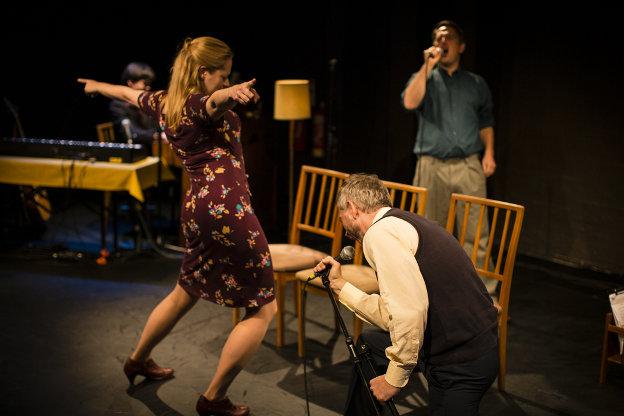The man himself meets us at the door with a smile, handshake and a bit of banter. He is the perfect host and good job too, for we are about to step into the stories of his now not-so-invisible-hometown, where the cast of his past become the cast of the present and where we get three Hughes for the price of one: Hugh is joined by his ‘brother’ Derwyn and his ‘sister’ Delyth.
Together, they invite us to journey into their childhood memories. Only Mama Hughes is absent but she is probably too busy enjoying her new house to care; indeed, it is the unexpected announcement of her decision to sell the Hughes family home that triggers Hugh’s latest investigation. But of course Hugh isn’t Hugh Hughes, he is Shôn Dale-Jones – and the rest of the Hughes aren’t Hughes either but hey ho, in for penny, in for a pound. This is the theatre after all – as Hugh is keen to highlight, pointing to the lights as indisputable proof.
Being taken on a journey by Hugh Hughes feels like a hot water bottle for the soul, a deeply comforting and warm experience that helps lull you into imaginative free-fall. Consistently engaging and witty, Dale-Jones radiates a spirit of trademark humility shared by all the members of his onstage sib-ship. As we collectively journey to Llangefni in Angelsey and are asked to add our own memories onto the projected footage of the roads of his hometown, the quest becomes a shared one and the route looks promising. The conversations between Hughes’ mother and Hugh are enacted with heartfelt humour, the live involvement of Gerry the pianist and Tom the sound operator give rise to some brilliant interaction, and Hugh’s own reflections on the nature of memory gathering, climaxing in a vivid monologue about the knack of memories to reproduce ad infinitum until they crowd in like ‘pebbles on a beach’, are touching.
It’s a road that’s not without its pit holes. Hoipolloi’s choice to constantly draw attention to all the mechanics of story building – introducing each character, explaining and framing each moment, highlighting each bit of possible theatrical artifice – has many a witty pay off, but also it has the accumulative effect of interrupting the story and seeming to apologise for it. It’s a narrative that needs no apology and one in which the threads of good drama are present in abundance: the quiet tragedy of Hugh’s father’s alcoholism, the lovingly tender characterisation of Hugh’s mother, the tension of his sibling’s enduring feud and their timely reunion, the triumph of the collective family spirit and the shared vision for the future all make for a powerful story. Over-indicating the building blocks – and slightly over-egging the pudding – means it’s much longer and more structurally fragmented than it probably should be. And at times, less interesting too.
Ultimately, Hoipolloi’s charm and whimsical spirit does paper over the cracks and leaves you feeling optimistic about ‘the frontier of the future’. My great-grandfather was called Hugh Herbert Hughes – as I proudly tell Hugh at the beginning – and if this wasn’t a fictional family and if Hugh was actually Hugh, I would be proud to be a part of the clan.


